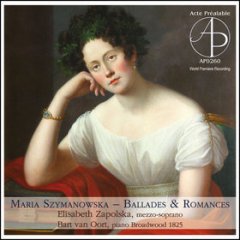Maria Szymanowska – Ballades & Romances (2012)
Maria Szymanowska – Ballades & Romances (2012)

1. Romance De La Reine Hortense 2. Le Depart 3. Complainte D'Un Aveugle Qui Demandait L'Aumone Au Jardin Du Roi A Paris 4. Romance A Josephine 5. Peine Et Plaisir 6. Romance Du Saule 7. Ballade 8. Romance A La Nuit 9. Le Connais-Tu 10. Se Spiegar Potessi 11. Romance Du Prince Galitzine 12. Casimir Le Grand 13. Hedwige, Reine Polonaise (1374-1399) 14. Jean Albert, Roi De Pologne (1459-1565) 15. Histoire Du Prince Michael Gliński (1470-1534) 16. Stefan Czarniecki (1599-1665) 17. Chant De La Vilia 18. Chant De La Tour 19. Alpuhara, Ballade 20. Ondine De Świteź 21. Cantilene A Deux Voix Zapolska Elisabeth, mezzo-soprano Oort Bart van, fortepiano Broadwood 1825
When choosing which of Maria Szymanowska's songs to include on this disc, the guiding light was the wish to show their diversity. While remaining attached to some singing practices of the period, the composer and woman of letters started to seek a new musical language, linked more to text content and the style of expression used: lyrical, oratory, ironic, libertine and so forth. Some of them were composed after receiving a commission, notably the five Historical Polish Songs by Niemcewicz, three of which found their way into the famous collection published for the first time in 1816. Others were born in the fever of improvisations, which the writers and performers of the period liked to indulge in at artistic salons. The ballads in Polish contain a large number of verses. They are abridged on this disc in order not to tire the modern listener, while conserving the essence of the story being told. The evident understanding between Szymanowska and Mickiewicz, a close friend, and future husband of her daughter Celina, gave Polish culture a few rare jewels. Szymanowska's repertoire for voice and piano possesses the same qualities as that for piano solo: its richness and modernity is only revealed through the creativity of the performer. --- acteprealable.com
Maria Szymanowska was born in the year of the French Revolution. Lest one suspect a link with another Szymanowski, she was actually born Marianna Wolowska into a Jewish family that had converted to Catholicism. She studied in her native Warsaw and performed in Paris where Cherubini, delighted by her pianism, dedicated his Fantasy in C to her. She married one Josef Szymanowski, a well off landowner. Despite having three children she managed extensive tours – Dresden, London, St. Petersburg, and Vienna – as well as composing a sheaf of music. Her reception in Russia was especially strong and she settled in St Petersburg with her daughters in 1827, only to die four years later during a virulent cholera epidemic.
Her songs contain Romances and historical explorations, and she frequently set significant poets both native and international, the latter group including Shakespeare. They are rather typical ballads of the first quarter of the nineteenth century too. Sometimes she writes dappled romances, such as Romance de la Reine Hortense or more theatrical tales such as Le Départ. The French influence that was so aesthetically prevalent is most apparent in Complainte d'un aveugle qui demandait l'aumône au Jardin du Roi à Paris, where its tripping elegance is pleasing. The setting culled from Desdemona’s Willow Song is very much a salon effusion, lacking expressive depth. Her Polish song settings are deeply immersed in balladry. The second of the set of five here is rather a conversational, conventional ballad, where the piano accompaniment is rather more involving than the vocal line, except for some dramatic parlando verses – quotations within the poem – which brings things powerfully to life. Warlike grandeur is alluded to in one of the settings. The last of the set reminds one of the kind of ballads Loewe wrote, or maybe Schubert.
At her worst she succumbs to strophic disease – the endless repetition of ballad verses until one can barely take any more (maybe Wilija counts in the category). Even so, some abridgement has been necessary to cut down on the verses here and elsewhere. At her best she is strong, powerful, with cleverly ambiguous piano writing and intriguing spoken moments.
Bart van Oort plays an 1825 Broadwood, of the type that Szymanowska preferred and he does so with insight and care. Mezzo Elisabeth Zapolska makes a more mixed impression: a thoughtful singer, clearly well versed in the early romantic milieu, she sometimes attacks from under the note and can be hooty.
Still, an interesting impression is left by this disc and note that the booklet cover shows a portrait of the composer painted in 1827 as a new arrival in St. Petersburg. ---Jonathan Woolf, musicweb-international.com
Kompozytorka, wirtuoz fortepianu i człowiek pióra, Maria Szymanowska zrobiła znaczącą karierę, między innymi na carskim dworze w Rosji; oczarowała nawet Goethego, który nie był przecież muzycznym „asem”. Nie przeszła jednak do historii. W tamtych czasach bardzo trudno było zaistnieć kompozytorce-kobiecie.
„Ballady i romanse” Marii Szymanowskiej to kompozycje pełne elegancji i subtelności, skomponowane zgodnie z gustem bywalców salonów tamtych czasów. W większości są one utrzymane w stylu francuskim, jednak tu i ówdzie znaleźć można italianizmy oraz akcenty klasyczne i romantyczne na wzór wiedeński, czy niemiecki, zwłaszcza w partiach fortepianu. Muzyka ta odzwierciedla dobry gust kosmopolity z ferworu świata, w którym Maria Szymanowska odniosła sukces. Całość zdobią jej tylko właściwe akcenty, wyciszony i subtelny wyraz geniuszu, który tak oczarował Goethego, oraz bardzo piękne efekty fragmentów mówionych bądź deklamowanych. --- muzeumliteratury.pl
download (mp3 @ kbs):
uploaded yandex 4shared mega mediafire zalivalka cloudmailru oboom uplea








